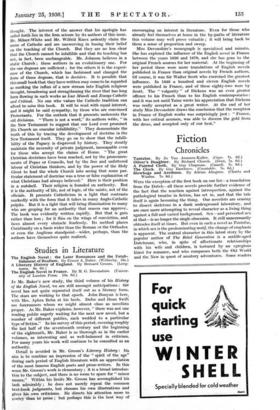Studies in Literature
The English Novel : the Later Romances and the Estab- mans. 8s. 6d.)
IN Mr. Baker's new study, the third volume of his History of the English Novel, we are still amongst anticipations : the novel has not quite separated itself out as a literary form. The stars are working to that epoch. John Bunyan is here, with Mrs. Aphra Behn at his heels. Defoe and Dean Swift are forerunners whom we might almost class as novelists proper. As Mr. Baker explains, however, " there was not one reading public eagerly waiting for the next new novel, but a number of different publics, each wedded to a particular type of fiction." In his survey of this period, covering roughly the last half of the seventeenth century and the beginning of the eighteenth, Mr. Baker is as thorough as in the earlier volumes, as interesting and as well-balanced in criticism. For many years his work will continue to be consulted as an
authority.
Detail is avoided in Mr. Groom's Literary History : his aim is to combine an impression of the " spirit of the age" during each period of English literature, with an appreciation of the most famous English poets and prose-writers. In this sense Mr. Groom's work is elementary ; it is a broad introduc- tion to the subject, and there is no room to spare for " minor names." Within his limits Mr. Groom has accomplished his task admirably ; he does not merely repeat the common text-book judgments, but chooses his own illustrations and gives his own criticisms. He directs his attention more to poetry than to prose ; but perhaps this is the best way of encouraging an interest in literature. Even for those who already feel themselves at home in the by-paths of literature this volume may well prove valuable ; it will bring back to them a sense of proportion and sweep.
Miss Devonshire's monograph is specialized and minute. She has explored the influence of the English novel in France between the years 1830 and 1870, and she has gone to the original French sources for her material. At the beginning of her period there were more translations of English novels published in France than original novels by French authors. Of course, it was Sir Walter Scott who exercised the greatest influence. In 1830 a hundred and eleven English novels were published in France, and of these eighty-two were by Scott. The " vulgarity " of Dickens was an even greater offence to his French than to his English contemporaries : and it was not until Taine wrote his appreciation that Dickens was really accepted as a great writer. At the end of her study Miss Devonshire draws the conclusion that the reception in France of English works was surprisingly just : " France, with her critical acumen, was able to discern the gold from the dross, and accepted only of our best."






































 Previous page
Previous page